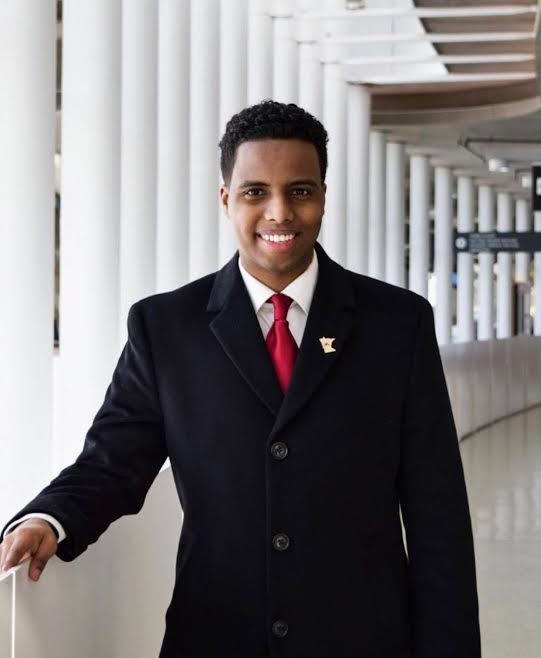As the second Black student to be student body president, Mohamed intends to lead with empathy.
By Sophia Zimmerman
Abdulaziz Mohamed knows he will assume office as president of the Minnesota Student Association (MSA) at a time ripe for real change.
It will be after a year-long pandemic shutdown, after the protests, after the verdict in the Derek Chauvin trial, after the killing of Daunte Wright and just as the University of Minnesota resumes in-person classes. All this creates new challenges and new possibilities for campus action, he said.
“It’s a long road to change, and it is going to take all of us taking steps to get there,” Mohamed said. “But there’s something brewing among students, and I feel like this year is the year to get things accomplished.”
As part of MSA’s first Black president and vice president duo who will take office this summer, Mohamed comes with all the passion and experience required. A second-year political science major who is minoring in business law and African American and African studies, has served as a member of the Student Unions and Activities grants committee, a project assistant for the Gopher Equity Project, and the federal government and legislative affairs coordinator for MSA.
He values honesty and integrity as his greatest strengths. As the son of Somali immigrants, he regards that community as an integral part of his life and where those traits are constantly affirmed.
“Honesty is always something you want to be able to attribute to everyone you ever talk to, because it’s the foundation of every conversation,” Mohamed said. “For someone like myself, that likes talking to people, I always want to make sure I’m giving my best when I’m talking to them.”
Mohamed gained early leadership experience as president of the 3,000-member student body at Stillwater Area High School in Minnesota. While his new constituency has grown substantially to 35,000 undergraduates, he says he will apply the same principles of leadership: listening to and respecting differences.
“There will always be people that have different ideas, and those ideas might also have conflicts in values,” Mohamed said. “Showing respect by listening to those ideas will do you good in the long run and allow you to better unite people.”
His parents are his role models, he says. Professionally, he says he looks up to former President Barack Obama, whom he remembers watching as a young child accomplish so much and take his place in history as the first Black president of the United States.
“For him to be the first Black president of the United States is something that really inspires a little Black boy like myself to dream big and to know I can do anything in this world if I work for it,” Mohamed said. “That is something I always carry with me.”
He has also drawn inspiration from student leaders who have come before him – specifically outgoing MSA president Jael Kerandi. Apart from serving as MSA’s first Black student body president, Kerandi led the movement to sever ties with the University of Minnesota Police Department (UMPD) following the murder of George Floyd in May of 2020.
“That’s leadership,” Mohamed said of Kerandi’s actions. “Unequivocal leadership that comes under excruciating pressure, and that’s something I really want to make sure that I exemplify and use as a model.”
According to his colleagues, Mohamed has consistently shown the traits of a leader throughout his two years at the University.
“He has this natural tendency toward leadership,” said Sam Parmekar, a fourth-year student and MSA’s state government and legislative affairs coordinator.
He described Mohamed as a consensus-builder, someone who makes people feel heard, gets along well with everyone, and brings everyone to the table. Parmekar said that his election to president as a second-year student speaks to how well Mohamed has established himself within the University community.
“Abdul is definitely a self-starter. He’s very ambitious and very committed to the work that we’re doing with diversity, equity, and inclusion,” said Najmo Yusuf, a student life adviser at the Office of Multicultural Engagement, who has worked to supervise Mohamed over the last year in his role at the Gopher Equity Project.
Despite never having met Mohamed in person due to the pandemic, Yusuf spoke at length about the way he cares for people, particularly the students he will serve as president. She said that he constantly strives to make students feel safe and understood.
Samiat Ajibola, a third-year student who will be Mohamed’s vice-president, agrees.
“I think a lot of students who are in these leadership positions forgot who they’re really serving, that it’s not only themselves,” Ajibola said. “Abdul has shown time and time again that he’s willing to sacrifice his own time and he’s willing to sacrifice his own prior commitments to ensure that he’s protecting people.”
When describing the work he’s trying to accomplish, beyond community activism and within student government, Mohamed offered a quote from the late Dr. Martin Luther King Jr.: “The arc of the moral universe is long, but it bends toward justice.”
Of the initiatives on Mohamed and Ajibola’s agenda, the pair plan to focus on student food and housing insecurity, mental health and UMPD accountability in the first half of their term.
Food insecurity and ensuring access to safe and affordable housing are at the top of Mohamed’s mind. The pandemic has only exacerbated these problems for students, he said, and he cites the campus’s entrapment in a food desert and a rise in off-campus student housing rates as evidence that both matters require urgent action.
The pair have already begun the process of hiring their staff of over 35 for MSA.They have also started appointing student representatives to different university committees, including the President’s Initiative for Student Mental Health (PRISMH) committee.
Mohamed emphasized the importance of a multi-faceted advocacy approach as they prepare for their work ahead. This approach will involve increased engagement with the Board of Regents, meetings with administration and the President’s office, and direct work with student groups on campus. He encourages students to be on the lookout for their first step in office, which will be the release of their “First 100 Days” plan on July 1.
“I ran because I wanted to do better and be better, and I wanted this organization and this university to do better and be better for students,” Mohamed said.

